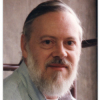Dennis Ritchie

Dennis Ritchie
Dennis MacAlistair Ritchie was an American computer scientist. He created the C programming language and, with long-time colleague Ken Thompson, the Unix operating system. Ritchie and Thompson received the Turing Award from the ACM in 1983, the Hamming Medal from the IEEE in 1990 and the National Medal of Technology from President Clinton in 1999. Ritchie was the head of Lucent Technologies System Software Research Department when he retired in 2007. He was the "R" in K&R C, and commonly...
NationalityAmerican
ProfessionScientist
Date of Birth9 September 1941
CityBronxville, NY
CountryUnited States of America
I'm still uncertain about the language declaration syntax...
Likewise, C managed to escape its original close ties with Unix as a useful tool for writing applications in different environments.
The visible things that have come from the group have been the Plan 9 system and Inferno, but I hasten to say that the ideas and the work have come from colleagues.
Over the past several years, I've been more in a managerial role.
At the same time, much of it seems to have to do with recreating things we or others had already done; it seems rather derivative intellectually; is there a dearth of really new ideas?
True enough that standards bodies themselves have weak teeth, but they do have influence and importance when a language begins to be widely used.
We really didn't buy it thinking we'd have this enormous investment,
Oh, I've seen copies [of Linux Journal] around the terminal room at The Labs.
Twenty percent of all input forms filled out by people contain bad data.
C was already implemented on several quite different machines and OSs, Unix was already being distributed on the PDP-11, but the portability of the whole system was new
C is peculiar in a lot of ways, but it, like many other successful things, has a certain unity of approach that stems from development in a small group
The notion of a record is an obsolete remnant of the days of the 80-column card.
When I read commentary about suggestions for where C should go, I often think back and give thanks that it wasn't developed under the advice of a worldwide crowd.
My work was fairly theoretical. It was in recursive function theory. And in particular, hierarchies of functions in terms of computational complexity. I got involved in real computers and programming mainly by being - well, I was interested even as I came to graduate school.